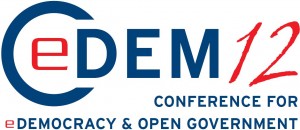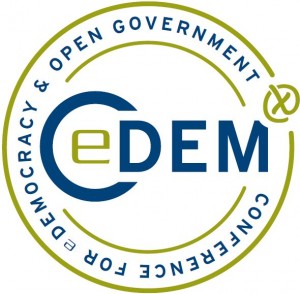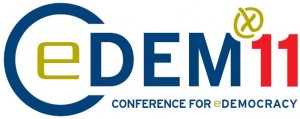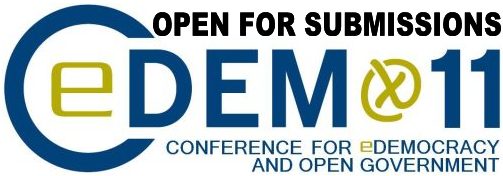CeDEM12 presents the following tracks:
- E-Participation

- Government 2.0
- Social/Web Media and Public Administration
- E-Politics and E-Campaigning
- European Citizen Initiative
- Participatory Budgeting
- Bottom-Up Movements
- Open Data and Open Access
Publications:
The conference proceedings will be published with the Edition Danube University; additionally, the complete proceedings will be made accessible online. A selection of best research papers and case studies of CeDEM12 will be published with the Open Access eJournal of eDemocracy and Open Government. (www.jedem.org)
- Research papers shall be 12 pages maximum and will be double-blind peer-reviewed.
- Case studies/project papers shall be 12 pages maximum and will be double-blind peer-reviewed.
- Reflections shall be 4 pages maximum and will be selected by the chairs.
You can download last year’s conference proceedings at the conference website!
Important Dates:
- Deadline for the submission of papers and workshop proposals: 12 December 2011
- Conference: 3-4 May 2012
Further Information
.
 CeDEM11: The international “Conference on E-Democracy and Open Government 2011” takes place in Krems (Austria) on 5 and 6 May 2011. A substantial supporting programme has already been planned.
CeDEM11: The international “Conference on E-Democracy and Open Government 2011” takes place in Krems (Austria) on 5 and 6 May 2011. A substantial supporting programme has already been planned.
Follow these Links for further Information
]]>For a full review of the conference: see the Digital Government 2.0 Blog!
]]>16 January 2011
Conference for E-Democracy and Open Government
5-6 May 2011
Krems, Austria
www.donau-uni.ac.at/cedem
Tracks
- E-Participation
- Open Data and Open Access
- Open Government
- E-Voting
Submissions
- Extended deadline: 16 January 2011
- 12 pages maximum
- Double-blind peer review
Conference Proceedings
- Print version and
- OA online version (eBook).
- Best papers will be published with the OA eJournal JeDEM
Detailed Information
]]>
During the last 10 years, the world has focused on social media and the new forms of societal behaviour, including content generation, collaboration and sharing as well as network organisation. These behaviours and expectations, in particular transparency and access to data, new ways of interacting with government and democratic institutions will continue to develop, and profound changes in society are to be expected. Society has been confronted with Open Government, Open Data and Open Access. What have the experiences been so far? How do these impact society, democratic structures and organisations? What changes occur at citizen level? What are the implications for democracy, society, science and business?
The Conference for E-Democracy and Open Government - CeDEM11 – presents the following Tracks (Submission Deadline: 1 Dec. 2010):
E-Participation
- Julia Glidden (21C Consulting, UK)
- Jeremy Millard (Danish Technological Institute, DK)
- Norbert Kersting (Stellenbosch University, ZA)
Open Government
- Philipp Müller (University of Salzburg, Business School, AT)
- Axel Bruns (Queensland University of Technology, AUS)
E-Voting
- Melanie Volkamer (Technical University Darmstadt, GER)
- Thad Hall (University of Utah, USA)
Open Data and Open Access
- Andy Williamson (Hansard Society, UK)
Location: Danube University Krems, Austria
Date: 5-6 May 2011
Further Information at the Conference Website:
https://www.donau-uni.ac.at/cedem
DEADLINE for SUBMISSIONS: 1 December 2010
]]>We were thinking about the challenges that lurkers present to us as e-participation researchers, and to the democratic process in general: is being ‘a face in a crowd’ at a political demonstration a bad thing? (no) and is it similar to lurking online? (yes). After all, just spending time at a demonstration or following a political topic is still a commitment. Therefore lurkers are interesting to us in their own right, and should not be negatively portrayed. Lurkers are better than ignorers after all.
We can’t expect everyone to be an activist (the 90-9-1 rule); but if we can understand their motivations to lurk, and what could motivate people to start taking (online/offline) action by the simple act of signing a petition that’s even better, broadening the pool of available activists.
There’s already a huge body or research into the psychology of online participation – all we’ve tried to do here is link them to one specific e-participation technology, and suggest some implications for future research.
You can download the presentation via this link.
Any comments or hints about any research on lurkers& lurking in e-participation is welcome!
]]>Call for Papers
During the last 10 years, the world has focused on social media and the new forms of societal behaviour, including content generation, collaboration and sharing as well as network organisation. These behaviours and expectations, in particular transparency and access to data, new ways of interacting with government and democratic institutions will continue to develop, and profound changes in society are to be expected. Society has been confronted with “Open Government”, “Open Data” and “Open Access”. What have the experiences been so far? How do these impact society, democratic structures and organisations? What changes occur at citizen level? What are the implications for democracy, society, science and business?
CeDEM11 presents the following tracks, which focus on these changes:
Track: E-participation
Co-chairs: Julia Glidden (21c Consultancy, UK) and Jeremy Millard (Danish Technological Institute, DK)
Track: Open Access and Open Data
Co-chair: Andy Williamson (Hansard Society, UK)
Track: Open Government
Co-chairs: Philipp Müller (University of Salzburg, Business School, AT) and Axel Bruns (Queensland University of Technology, AUS)
Track: E-voting
Co-chairs: Melanie Volkamer (Technical University Darmstadt, GER) and Thad Hall (University of Utah, USA)
.
Deadline for submissions of papers and workshop proposals is 1 December 2010. Submissions shall be 12 pages maximum.
The conference proceedings will be published with the Edition Danube University; additionally the complete proceedings will be made accessible online. A selection of the best papers of CeDEM11 will be published with the Open Access eJournal of eDemocracy and Open Government (www.jedem.org).
.
We would like to invite individuals from academic, applied and practitioner backgrounds as well as public authorities, NGO/NPOs, education institutions and independent organisations to submit their research and project papers as well as workshop proposals related to the CeDEM11 Tracks. We welcome different multidisciplinary and interdisciplinary approaches and disciplines including (but not limited to): law & legal studies, social sciences, computer sciences, political sciences, psychology, sociology, applied computer gaming and simulation, democratic theory, media and communication sciences.
Conference Chairs: Peter Parycek (Danube University Krems, AT), Manuel J. Kripp (E-Voting.CC, AT) and Noella Edelmann (Danube University Krems, AT)
.
Keynotes
Axel Bruns (Associate Professor, Creative Industries Faculty at Queensland University of Technology, Brisbane, AUS)
Stefan Gehrke (CEO, Politik-Digital, Berlin, GER)
Caroline Haythornthwaite (Director, School of Library, Archival and Information Studies, University of British Columbia, CAN)
Elke Löffler (CEO, Governance International, Birmingham, UK)
Doug Schuler (Program Director for the Public Sphere Project; Member of the Faculty at Evergreen State College, Olympia, Washington, USA)
.
Conference Website: https://www.donau-uni.ac.at/cedem
]]>KEYNOTE
ANN MACINTOSH (UNIVERSITY OF LEEDS): ARGUMENT VISUALISATION ? THE KEY TO UNLOCKING ONLINE DELIBERATION??
„The trouble with socialism is that it takes up too many evenings.“ (Oscar Wilde)
Macintosh presentation focused on argument visualisation with reference to it’s possible value for policy making. Before combining these two research topics, she summarised the history and current state of research in the field of online deliberation by browsing to the main arguments of the following book titles which argue the need for deliberation:
- Hay 2007: Why we hate politics
- Stoker 2006: Why politics matter: Making demoracy work
- Fishkin 1991: Democracy and deliberation
- Dryzek 200: Deliberative democracy and beyon
Others then claimed a potential of the internet for enhancing deliberation, like Dahlgren 2005: The internet public sphere. Whilst this is not a new research area (see Dutton 1992: Political Science research on teledemocracy), with the more sophisticated technology of today we are moving from the traditional text-based to a new form of deliberation. And with people using the web 2.0 a much bigger audience is attracted. Macintosh argued that the linear form of information in debate fails to capture real life argument patterns and does not enable people to think of arguments. The capacity of technology has not been like we expected it in the 90ies. It’s potential to enhance democracy has not been realised yet. Why is that? The overall reason might be to many expectations: One one hand, we are expecting too much from governments and politicians (they need to give up power), on the other hand too much of the citizens (e.g. with reference to the digital divide). Not least we’re also expecting too much of technology.
Online deliberation presents large problem spaces. Coming up with an own opinion and to formulate an informal contribution is difficult, especially when taking into account the complexity of policy development. From the socio-technical perspective, the problems are the following:
- making sense of unstructured text
- knowing what critical questions to ask
- ensuring inclusive deliberation.
This is where argument mapping comes into play – seen as a tool to make sense of unstructured text and visualising language. Argument visualisation provides an alternative way of representing text in online deliberation forms. TheODET 2010 workshop was dealing with online deliberation tools emerging from the labs. If you are interested in argument mapping it is worth browsing the posts tagged „argument mapping“ on https://digitalcitizenship.co.uk where you’ll find a video covering some of the tools presented at the conference.
SESSION 1
YANNIS CHARALABIDIS: TOWARDS A SYSTEMATIC EXPLOITATION OF WEB 2.0 AND SIMULATION MODELLING TOOLS IN PUBLIC POLICY PROCESSES
The idea of the PADGETS concept is not to pull users into sites but to go where they already are, bringing together two well established domains; the mashup architectural approach of web 2.0 for creating web applications (gadgets) and the methodology of system dynamics in analyzing complex system behaviour. The objective is to develop and deploy a toolset that will allow policy makers to graphically create web applications that will be deployed in the environment of underlying knowledge in Web 2.0 media. To overcome the problem of politicans giving low feedback one could combine the tool with election times.
PIETRO SPERONI DI FENIZIO: DON’T VOTE, EVOLVE!
This was basically a mathematical approach to the following question related to eVoting processes: Given an open question, how can we find an answer that has the most wide support? Whilst open questions are more related to consulatation (example for an open question: „What’s the meaning of life?“), closed questions are typical eVoting questions (e.g. „Does god exist?“). The presented concept aims at providing a final document representing the will of people through an unification of answers in order to find an agreement. In a system where users come up with answers to a question and vote for the answers this is done by a genetic algorithm of answers: one is only allowed to fairly throw away an answer from a mathematical point of view. Different answers compete, and to overcome the problem of the tyranny of the majority only answeres dominated by others are taken away. Applying the Pareto Frontconcept, the most dominant answer will always stay there and each person will find at least one of the answers he/she has voted for in the Pareto Front.
TODD GRAHAM: THE USE OF EXPRESSIVES IN ONLINE POLITICAL TALK: IMPEDING OR FACILITATING THE NORMATIVE GOALS OF DELIBERATION?
Graham examined everyday informal political talk by examining speech talks and the role of expressive talks in online political talk of the Guardian. Expressives are notions like humour, emotional comments and acknowledgement. By applying content analysis and textual analysis he found that 43 % of the postings contained humour. 29 % expressions were emotions (e.g. anger) and 28 % acknowledgements. Especially rational humour plays a substantial role amongst the codes for extended debate. Graham propsees to go beyond the analysis of sheer text and not to neglect expressives when looking at the normative conditions of deliberation.
In the afternoon, I listened to the track focusing on the evaluation of eParticipation projects.VoicE and VoiceS were projects aiming for giving people a voice in EU legislation.
SABRINA SCHERER: A REGIONAL MODEL FOR E?PARTICIPATION IN THE EU: EVALUATION AND LESSONS LEARNED FROM VOICE AND VOICES
The thematic scope of the project VoicE was on consumer protection. VoicE is a regional eParticipation model as an means to attract citizens for EU policies and to motivate them to participate. Evaluation followed the Model of Mcintosh and Whyte (2008). About 200 useres a day visited the website. However, there was low active participation and few reactions from politicians – the involvement of politicians could not be successfully implemented. Retrospectively one can also say that information how to influence the policy making process was not transparent enough for the useres. The regional approach was good in principle, but it is hard to realise a real impact on Brussels. Moreover, the target group was very homogeneous. VoiceS continues the project. Recommendations for VoiceS include that the topic of discussion and substantial media coverage are crucial. It is important to have a well-defined participation process. A more interactive platform aiming at a smaller target group is liketly to be more successful. A new feature of the successor project includes a game where citizens can take on the role of either a EU commissioner, a parliamentarian, a lobbyist or a minister. Participation sections are integrated in a news section as most of the visitors come to the platform via search engines when looking for information on the topic consumer protection.
Thank you for the organisers of EGOV 2010 and ePart 2010 for your efforts – keep up the good work!
- Information on next year’s EGOV and ePart 2010 conferences
- CEDEM 2011 conference on eDemocracy, eParticipation, eVoting and Open Government
EGOV 2010 OPENING
The EGOV 2010 was taking place outside the DEXA framework for the first time this year, starting with some facts and figures about this year’s papers and the invitation to the next conference in Delfth (15 min. from Amsterdam) 2011. Keynote K. Holkeri from Finland focused on open and inclusive policy making.
KATJU HOLKERI FOCUS ON CITIZENS ? OPEN AND INCLUSIVE POLICY?MAKING
„It makes me a better leader because it forces me to hear opinions that I don’t want to hear“ (B. Obama to chinese students)
Fins tend to think that they’re very good in inclusion. However, one has to distinguish between traditional consultation (government as an owner, consultation when work is done) and participation and inclusion with a variety of tools. The instrumental reasons for going from participation 1.0 to 2.0 are a better outcome, lest costs, higher compliance, a respondense to greater diversity and innovative solutions. According to Holkeri, innovation is one of the key issue of governments as they struggle with innovative options. Consequently, what Holkeri expects most from research is research on innovation.
Whilst in Finland there is a good basis of democracy, one could also see a tendency towards a so called „tired democracy“: openness is good, but trust in the government is still declining. The OECD therefore published a list of principles for open and inclusive policy making. Holkeri also addressed the risks of this concept, e.g. delay in policy making, hijacking by special interest groups, conflicts with the roles of politicians, administrative burden or consulation fatigue. Now why does not everyone participate anyways? According to a Finnish survey, the first reason is a low interest in politics, followed by low trust in governemnts and a lack of time. Other reasons are that people see no personal gain or believe that interestests are protected by others. Very few are content with current politics and even noone is unsatisfied with existing tools. Now what we should focus on is a common commitment and strategy as opposed to only several tools.
A finnish project with 800 young visitors a month is habbo hotel.
CITIZEN PERSPECTIVE
The track on the citizen’s perspective somehow lacked the real citizen focus but covered a broad range of studies from the improvement of e-mail-communication using language technology to the development of a framework for enriched online discussion forums for policy making. The IMAIL project aims to increase the quality and efficiency of office work by automatically answering emails from citizens for officers with answer templates. Interestingly enough, about 42 % of incoming emails to an European education provider could be answered with 9 different standard answers (Scheffer 2004). A Swedish social insurance agency receives around 40.000 emails per month with 640 handling officers. More information on the other text analysis project, IMPACT (Integrated Method for Policy Making Using Argument Modelling and Computer Assisted Text Analysis) can be found here. This is more or less only for participants who are willing wo participate in complex systems.
SHARON DAWES (NY): STRATEGIES FOR OPEN GOVERNMENT: TOWARD A NEW RESEARCH AGENDA
Dawes gave an overview about Open Government and escpecially the Open Data strategy, pointing out what’s old and new and focusing on both praise and criticism of the concept. There is a long tradition of open access and open information, but what is new is the commitment to openness without the citizens having to request information. (pro-active data release). Points of criticism are: uneven usability and no support, stewardship practises, questionable relevance of content, inadequate metadata or lack of feedback mechanisms. Research findings showed that the fitness for use determines the value of data for any given use or user. Moreover, understanding data also requires to understand how data is produced. A case study of parcel data (selected organisations were interviewed) examined costs, issues, interest, uses and flow of the data. It showed that the stakeholders identified are quite different. Dawes’ recommendations for governments were to build data dissemination policies into regular business and to ensure meta data standards as well as a support for users and officials. Research should focus on the following topics: Which information creates which value?; the exploration of public value proposition from multiple perspectives; the development of tools and mashups.
The track also included an analysis of the structure of the eGov-community by a citation network and social networks analysis.
CHRISTOPH SCHALLER: ADVANCED COCKPITS FOR MUNICIPALITIES: FOCUSING ON THE RELEVANCE AND CHALLENGES OF IMPORTING DATA
The goal of this project assessed in pilot municipalities was to develop a web-based management cockpit for strategic and info-based leadership drawing on the fact that management is becoming increasingly difficult in small and middle municipalities. From the IT point of view one can adapt business intelligence models for municipalities. The data types used for this project were basically citizens register data and financial data. One of the lessons learned from the project is that it is absolutely necessary to import detailed data and to pay special attention to data quality and data protection regulations. Further activities include user training and ensuring the long-term activity of the cockpit. Project details to be found on gemeindecockpit.ch.
DZHUMALIEVA, STEFKA: VALUE ASSESSMENT TOOL FOR ICT PROJECTS AT THE EUROPEAN COMMISSION
The VAST tool is designed to examine the value and therefore the success of ICT projects in terms of efficiency (monetary value) and public value. Public organisations are increasingly managed with constant or diminishing resources and decisions for new investments have to be taken cautiously. Building on existing value assessment methodologies, VAST is a custom-made value assessment tool tailored to the context of the European Commission. Its use helps to identify the value of an ICT project going beyond the traditional financial paradigm and allows cross-comparison between similar projects.
]]>
After a hailstorm, the official reception in downtown Bregenz (hostet by the Regional Government of Vorarlberg) and spending a good time in probably one of the smallest pubs in Bregenz the second day of the evote2010 started with the topic operation and evaluation of e-voting systems. [a vistor's report]
CARL MARKUS PISWANGER: OPERATIONAL ISSUES OF A HIGH SECURITY COMPUTATION CENTRE
E-voting as one of the most challenging projects ever within the Austrian Federal Computer Centre, basically due to security reasons and new dynamic processes. Some key figures of the BRZ-Operations were over 800 servers, over 320 implementations and over 1500 network devices. Throughout the project 7 % of the total stuff were involved.
As for operational security, the majority of processes had to be built up especially for the project. For the online election administration system, more than 230.000 „sector specific PINs“ were created (between 90 and 97 % automatically). Test procedures have been based on the security requirements and risk analysis (partly based on the organisation and partly on the technical handbooks. The most critical risk scenarios were data security risks or risks in the field of communiation). Piswanger explained the monitoring and emergency plan from the organisational and technical point of view. The election observation system contained infrarot cameras and 24 hour observation. There was a continuous support for students and election commissions. However, bout a third of the questions was on the citizen card and there were not too many technical questions. Overally (and apart from the beautiful act of destroying the data in the end alone ), the project was a huge lessons learned process.
Upcoming events taken from the talk of Melanie Volkhamer:
In the afternoon I listened to the track „e-voting experiences“*.
THAD HALL, LEONTINE LOEBER: ELECTRONIC ELECTIONS IN A POLITICIZED POLITY
Hall and Loeber were examining data from the Nederlands and the U.S. The experiences in these two countries with e-voting are different. In the U.S. voting technology has become politicised (after Obama became president, voting technology was all fine). In the Netherlands there is a „hacking“ problem started with machines in the 1960s. But issues were raised around the question of trust (although in 2006 80 % of the people claimed to trust the voting machine).
One of the measured attitutes of people I found pretty interesting was voter confidence. In the U.S. it turned out that democrats think e-voting is more fraud prone while liberals are less confident than others. In the Nederlands, people simply like to vote and the method of voting does not seem to affect their trust. Blank ballot voting has a lover level of trust though. In the Netherlands, as opposed to the U.S., there is no winner’s effect. Winning party and trust in voting are not related, and the social party has a lower voting trust, whereas the Liberals have more voting trust.
ANDREAS EHRINGFELD, LARISSA NABER, THOMAS GRECHENIG, ROBERT KRIMMER, MARKUS TRAXL, GERALD FISCHER: EXPERIENCES OF SPECIFIC ATTACKS AGAINST THE FIRST LEGALLY BINDING IMPLEMENTATION OF EVOTING IN AUSTRIA
E-voting is a very emotional topic. From the beginning, there were many oppoents and activists. The timeframe and highest requirements on security (buying hardware in 6 months etc.) were the most difficult tasks and made the project a very tough one. Different attacks happened.
]]>
